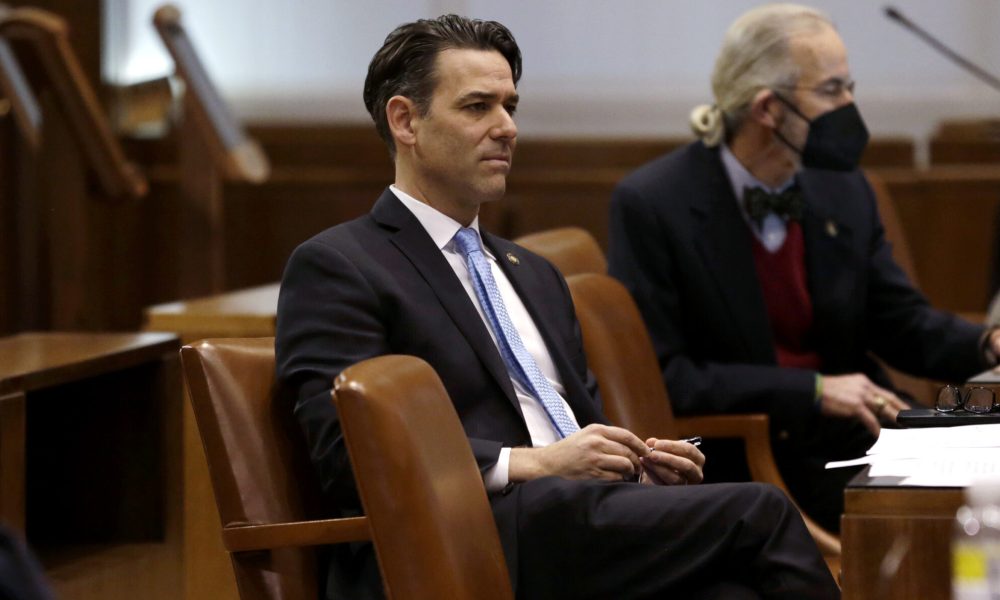Rob Wagner first walked into the Oregon Capitol in 1997 as an intern for a first-term Democratic state senator from Portland. In January, as his first political boss, Gov. Kate Brown, leaves office, Wagner is set to take on a new role as Senate president.
It’s been a winding road to the Senate’s top job for Wagner, who recently served as the chamber’s Democratic leader. He didn’t last long as a Senate intern – he said Brown always says he only made it a day, though Wagner thinks he worked for at least a couple of weeks before he caught the lobbying bug.
That early work with lobbyists from the Oregon Nurses Association and Portland Public Schools led Wagner to obtain a master’s degree in public policy from George Washington University after he graduated from Portland State University. The Lake Oswego native returned to Oregon in 2002 as the political director for the American Federation of Teachers.
Democrats had just managed to tie the Senate, and after weeks of tense negotiations, the 15 Democrats and 15 Republicans settled on naming Sen. Peter Courtney, a Democrat from Salem, as the chamber’s next president. Courtney is retiring in January after an unprecedented 20 years as Senate president.
“This lobbyist friend that I was talking to said, ‘Did you ever think back in 2003, when you were in your first term, working for AFT, that you’d be the next Senate president?’ I never thought that my career would necessarily go this direction,” Wagner said.
Wagner said he has no intentions of trying to step into Courtney’s shoes, saying that would be impossible. He describes his style as more subdued than Courtney’s and said he plans to do a lot more listening than speaking as he moves into the role.
“There’s always something every day new to learn about something that I didn’t know, and you have some of the smartest people in the state that are willing to come here and teach you about it,” he said. “So if you’re open to that, I think it’s fascinating.”
That includes working with Senate Republicans, who shrank the Democratic majority to 17 of 30 seats in the November election. Senate Minority Leader Tim Knopp, R-Bend, responded to the news that Democrats selected Wagner as their president-designate by promising that no Republicans would vote for him and saying Wagner is “untrustworthy, deeply partisan, and doesn’t have the necessary skills to run the Senate in a bipartisan fashion.”
The first time the two were at the Capitol together after Knopp made those comments, Wagner met Knopp in the Republican’s office. Over sandwiches – a ham on white for Knopp and a cheese and pickle for Wagner – the two discussed their goals for the upcoming legislative session.
”Now every single week we’re gonna get a sandwich together and just talk about issues,” Wagner said. “If people are saying stuff, I feel like it’s my job, especially in this position, to go and just meet them where they’re at, and so I’m going to continue to do that work.”
Knopp told the Capital Chronicle there are still no Republican votes for Wagner as president, but he’ll meet with anyone who will listen to his caucus’s concerns, which include ensuring that Oregonians receive the “kicker” rebate triggered whenever state revenue exceeds projections and limiting the authority of future governors after Brown and state agencies exercised a lot of power during the continuing pandemic state of emergency.
“The key to any legislative relationship is that everybody’s voice has to be heard, and we obviously had a track record of that with Senator Courtney for 20 years in the Senate who built a reputation for trust and integrity and for making sure that the minority voice was heard and respected,” Knopp said. “Senate designee Wagner doesn’t have that and hasn’t had the time to build that up.”
Wagner said Senate Democrats, like incoming Gov. Tina Kotek and the Democratic majority in the House, will be focused mainly on housing, homelessness and support for mental health and addiction. But there are also a number of other thorny issues the Legislature needs to address.
The state has less than one-third of the public defenders needed to represent people accused of crimes who cannot afford to hire their own attorney. There were at least 800 people who lacked representation as of November, when the Legislature’s Joint Emergency Board approved a $10 million infusion to the state’s public defense agency, and judges have been dismissing cases.
The Legislature will also get involved in debate over replacing the Interstate 5 Bridge, which connects Oregon and Washington. The estimated cost of a new bridge ballooned from a range of $3.2 to $4.8 billion in 2020 to a new range of $5 to $7.5 billion in December.
Lawmakers in Washington earmarked $1 billion last year, expecting Oregon to make a similar contribution. Arguments over transit and pedestrian access, cost and tolls, which are common in Washington and not yet used in Oregon, have played out in Oregon Transportation Commission meetings and are almost certain to consume legislative time this year.
A new voter-approved law barring legislators with more than 10 unexcused absences from holding office the following year means that Wagner may not have to deal with the legislative walkouts that plagued Courtney in 2019, 2020 and 2021. The Oregon Constitution states that a quorum of 20 senators and 40 representatives is needed to do business, meaning the minority can shut down the Legislature if negotiations fail.
“I think the voters were really clear that they want people to show up to work and do the job that they’re paying them to do, so I’m hoping that that doesn’t become a threat,” Wagner said. “I’m pretty positive that it’s not going to be, but again, it’s just the fundamentals, it’s meeting people where they’re at, being actively engaged, giving people the opportunity to give voice to issues that might be uncomfortable. And I’m pretty confident that we’re gonna have a good legislative session.”
Oregon Capital Chronicle is part of States Newsroom, a network of news bureaus supported by grants and a coalition of donors as a 501c(3) public charity. Oregon Capital Chronicle maintains editorial independence. Contact Editor Lynne Terry for questions: [email protected]. Follow Oregon Capital Chronicle on Facebook and Twitter.
STORY TIP OR IDEA? Send an email to Salem Reporter’s news team: [email protected].

Julia Shumway is deputy editor of Oregon Capital Chronicle and has reported on government and politics in Iowa and Nebraska, spent time at the Bend Bulletin and most recently was a legislative reporter for the Arizona Capitol Times in Phoenix. An award-winning journalist, Julia most recently reported on the tangled efforts to audit the presidential results in Arizona.









